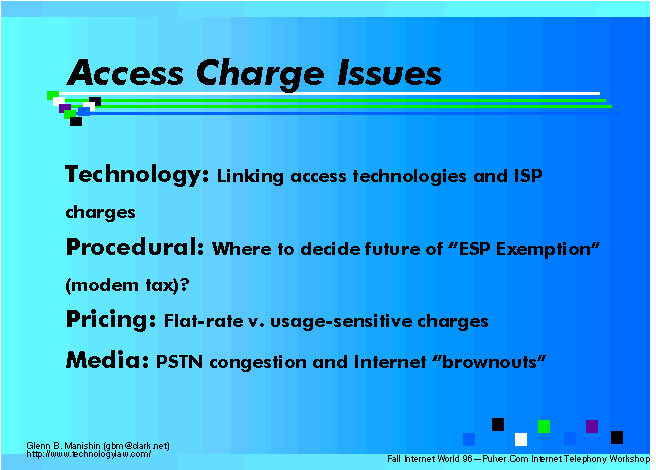
Access charges -- the fees paid by long-distance telecom providers to LECs for origination and termination of calls using local phone network facilities -- are the next battleground in the war between the PSTN and the Internet. Access charges account for as much as 60% of the costs of long-distance telephone calls, and are presently about 3¢ per minute (or 6¢ per minute on both ends of a call). It is widely recognized, however, that the actual cost of access is far less, with much of the difference accounted for by universal service subsidies that the FCC is in the process of restructuring in order to "de-link" access and universal service.

The Bell companies and other LECs have been lobbying the FCC for months to repeal the 1980s-era rule under which ISPs and online service providers ("OSPs) do not pay access charges. Their position is simple: increased Internet "dial-up" usage is creating "congestion" of the PSTN (because average connection times for Internet usage are far longer than typical telephone calls), thus increasing the LECs' switching and network engineering costs. According to the LECs, the regulatory question is who pays for these increased costs?
But the real question presented by the growth of the Internet is different -- how to harmonize the usage-based, settlements system of telecom pricing with the Internet? From this perspective, the LECs have ignored the linkage between access technologies more appropriate for packet-switched Internet data than circuit-switched local loops and the the price ISPs should pay for use of LEC facilities. Other important issues include:
Process: Should the Commission address access charges for ISPs in the context of overall access charges for telecom providers, or begin a special proceeding dedicated to examining the relationship between ISP usage and LEC costs?
Pricing: Would imposition of usage-based access fees on ISPs threaten the flat-rated pricing plans currently available for Internet access, and is it appropriate for government policy to dictate pricing for ISP services?
Media: Can the Internet community organize a concerted response to the LECs' media barrage, under which most of the consumer and popular press has already "decided" -- prematurely -- that the Internet is threatening the PSTN?